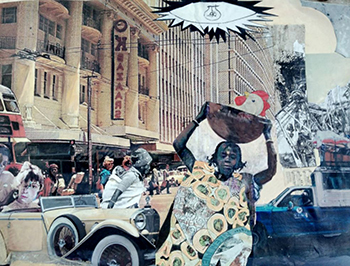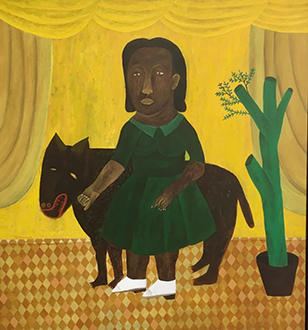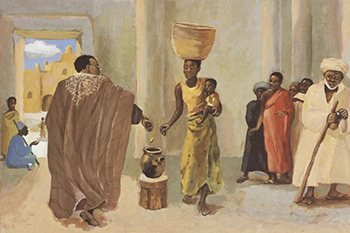For Sunday August 14, 2022
Lectionary Readings (Revised Common Lectionary, Year C)
Isaiah 5:1-7 or Jeremiah 23:23-29
Psalm 80:1-2, 8-18 or Psalm 82
Hebrews 11:29-12:2
Luke 12:49-56
From Our Archives
For past essays on the lectionary for this week, see the essay by Debie Thomas, Disturbing the Peace; and two essays by Dan Clendenin, A Quest That Goes Nowhere and Not Peace but Division: The Embarrassing Words of Jesus.
Michael Fitzpatrick is a parishioner at St. Mark's Episcopal Church in Palo Alto, CA. After growing up in the rural northwest, he served over five years in the U. S. Army as a Chaplain's Assistant, including two deployments to Iraq. After completing his military service, Michael has done graduate work in literature and philosophy. He is now finishing his PhD at Stanford University.
Psalm 82 is a powerful, mythological portrait of the Almighty as the righteous judge holding court and giving an evaluation of the “gods” who legitimate the power of earthly “princes.” The Most High speaks these words of judgment:
How long will you judge unjustly,
and show favor to the wicked?
Save the weak and the orphan;
defend the humble and needy;
Rescue the weak and the poor;
deliver them from the power of the wicked. (vv. 2-4)
This Psalm expresses the deep thread running through the whole of the Hebrew Scriptures that God takes sides — not as we humans do, where we favor tribe against tribe, political party against political party, family against family. No, the Creator of all people takes sides against the wicked and for the vulnerable. That is the fundamental division God recognizes.
 |
|
"Marikana Widows" collage by South African artist Ayanda Mabulu. |
Passages like this one from Psalm 82 name paradigmatic vulnerable communities in the ancient Near East, such as the poor and the orphan. Although not explicitly mentioned here, another paradigmatic community named throughout scripture are widows. Women were already vulnerable in ancient societies, often viewed as property or even spoils of war. To survive, women needed favorable marriages with tribal leaders who would provide protection and provision. Thus a woman who lost her husband would be significantly exposed to abuse and violation.
These are not simply ancient realities left in a distant past. Women in much of the world still live under these conditions. I recently had the opportunity to read Loreen Maseno-Ouma’s remarkable 2014 study, How Abanyole African Widows Understand Christ. A Kenyan scholar, Maseno-Ouma might be properly called a “theological anthropologist” for the way she goes about her work. In this study, she examines the lived reality of present-day widows in East African society, and how this shapes their understanding of Jesus as their savior. The Abanyole are a tribe from the Bunyore region of western Kenya.
Maseno-Ouma describes the life of an Abanyole widow as “liminal.” Womanhood in Abanyole culture is one of custodianship, living in the orbit of a male who will take responsibility for each woman. At birth, their custodian is their father, and custodial care is transferred to the husband in marriage. To be a widow then is to be a woman without a custodian, to be a woman whose status is lesser than the other women who have men to protect and provide. This results in ridicule, mistreatment, and exploitation of widows by the tribe. Some widows report being seen as “useless and non-beings,” inferior to even “a girl child” in the social hierarchy.
A central experience to the Abanyole widow is loneliness. They must isolate from the rest of the tribe for survival, as a woman without a “custodial male” is easily misinterpreted. Maseno-Ouma writes, “Should widows walk leisurely around the village and the shopping areas, they are easily mistaken as seeking male friends.” Widows have to be very careful to not casually speak to men. Yet they often have to also avoid their female friends, because most of them are married, and married women can fear that widows will try and seduce their husbands away from them. Asking for help, even professional help such as legal advice, can often be a difficult task due to the culture of suspicion. And all of this on top of their exposure due to loss of income and tribal protection and their vulnerability to men who will seek to aid them in exchange for sexual favors.
Maseno-Ouma describes how Jesus becomes a saving reality for these women. Foremost, Jesus becomes a kind of omnipresent custodian for them, the loving male who will claim them and never abandon them. In dealing with their loneliness, many widows report taking great comfort in knowing Jesus is with them. A widow who was accused of killing her husband after he overdosed on an unprescribed medicine said that she was able to face her accusers courageously at the funeral because Jesus was standing by her side advocating for her. Jesus provides for her, feeds her, clothes her, and defends her against false witnesses. To have Jesus as persistent friend, righteous custodian, and faithful advocate helps widows face debilitating alienation and loneliness.
 |
|
"The White Shoes" painting by Sudanese artist Salah Elmur, 2017. |
When asked how they know that Jesus cares for their plight, many widows say Jesus was himself one who was scorned and rejected by society, who suffered and died upon the Cross. The story of Jesus’ crucifixion gives them great comfort as they carry their own crosses. Therefore, when they experience Jesus coming to them, it is as a kindred spirit, a fellow-sufferer who understands (to use A. N. Whitehead’s pregnant phrase). This allows Jesus to be the constant companion, the reliable provider, the one who will never leave, because he’s proven this faithfulness at the Cross.
Maseno-Ouma summarizes the experience of Jesus in Abanyole widow experience through several remarkable metaphors, two of which I will focus on. The first is that in the life of these widows, Jesus is present to them as breath itself. She writes, “Jesus is so close to them, by them, with them, energising them, breathing in them.” Just as our biological respiration sustains our bodies, moving much needed oxygen to every cell, so Jesus totally saturates their life and being, even to the point that the widows report feeling Jesus’ strength and presence when they are asleep.
The second metaphor is Jesus as skin. This may seem shocking at first, but I find it an invigorating way to meet Jesus through Abanyole widow experience. Widows had experienced security in the presence of their husbands. The death of their husbands left them “uncovered” and “exposed,” open to slander and false accusations with no man there to defend them. Of course, such abuse could be experienced while married, but in such cases the widows felt they could “speak loudly” in response because “they have a husband behind them, who would defend them.” It is into this void that they see Jesus coming, acting as protector and advocate on their behalf, allowing them to recover their voice to “speak loudly” once more knowing Jesus stands with them, protecting them.
So Jesus functions as the “skin” of their being. The skin of the body protects and holds the body together, acting as a buffer between the outside world and the internal organs. The skin also envelops our bodies. In this way, Jesus is seen as an omnipresent protection, as close to us as our own skin. It also powerfully brings to life the advocacy of Jesus for those who have experienced abuse because of the color of their skin.
I’ve shared Maseno-Ouma’s study of the Abanyole widows as a lens through which to see the pregnant meaning of biblical passages like Psalm 82. It is a Psalm about judgment — and judgment is a good thing, for it is none other than a defenseless widow being able to stand up to her hecklers and say, “The Almighty who makes and redeems all things stands with me. This God has sent Jesus to be my very breath and skin.” To believe in a God who issues judgment is nothing else than to believe in a God who takes sides against the wicked and for the vulnerable.
 |
|
The Widow's Mite, Jesus Mafa.
|
Which might reframe how we read the Gospel lesson for this Sunday. Contrary to popular impressions, Jesus issued words of judgment as much as any other voice in scripture, and none so viscerally as the text at the end of Luke 12. Perhaps we might better understand his meaning if, in the list of those who will be set against each other — mother against daughter, in-laws against their children’s spouses — we include “widows against married women who heckle them and men who exploit them for sexual favors.” How does Jesus’ statement that he has come “to bring fire to the earth” read in that light?
Certainly the God who was in Christ is the One who made all things, who “so loved the world” that redemption is offered to all. But God is also the One who defends the weak and the orphan, the humiliated and the poor. Jesus’ message is Good News for all who will repent and turn; it is judgment to all who use their power to engage in wickedness against the vulnerable. If our own family members are among the “wicked powers” (for they are someone’s family), should we not expect our commitment to follow Christ to divide us? For we follow the Christ who is breath and skin for widows in places where widows are “useless and non-beings.” May we give thanks then for the Jesus who brings not peace but division because he is the fellow-sufferer who understands the life of an Abanyole widow.
A Weekly Prayer
St. Caedmon (fl. 658-680)
Now let me praise the keeper of Heaven's kingdom,
the might of the Creator, and his thought,
the work of the Father of glory, how each of wonders
the Eternal Lord established in the beginning.
He first created for the sons of men
Heaven as a roof, the holy Creator,
then Middle-earth the keeper of mankind,
the Eternal Lord, afterwards made,
the earth for men, the Almighty Lord.
Michael Fitzpatrick welcomes comments and questions via m.c.fitzpatrick@outlook.com
Image credits: (1) InYourPocket.com; (2) Women's Literacy in Sudan; and (3) Pastor Allende blog.





